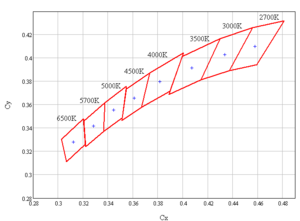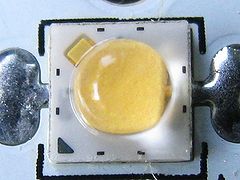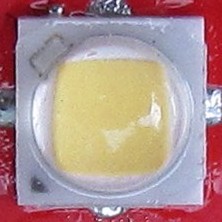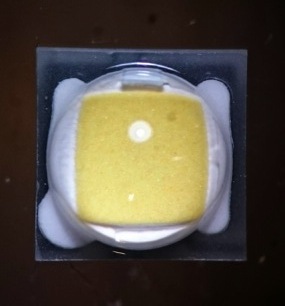Nichia: Difference between revisions
(add ANSI white thumbnail) |
No edit summary |
||
| (10 intermediate revisions by the same user not shown) | |||
| Line 1: | Line 1: | ||
[[File:Ansiwhite.png|thumb|300px|The basic ANSI C78.377-2008 quadrangles (red) with centers (blue +). Nichia uses these blocks, but calls the 4500K block SW45.]]Nichia is a Japanese LED company. Their low powered 5mm | [[File:Ansiwhite.png|thumb|300px|The basic ANSI C78.377-2008 quadrangles (red) with centers (blue +). Nichia uses these blocks, but calls the 4500K block SW45.]]Nichia is a Japanese LED company. Their low powered 5mm LEDs are still used in some flashlights. | ||
For high power | For high power LEDs the Nichia chromaticity binning codes are now based on [[ANSI White]] quadrants. A bin of SW50 is an ANSI quadrangle of 5000K (SW45 is 4500K and so on). Forward voltage bins are L (2.7-3.1V) and M (3.1-3.5V). | ||
The '''Nichia 119A and 219A''' series seem to be identical on the top, with the difference being the layout of solder pads on the bottom. The 219's solder pads match the [[Cree]] XP-G which is the same physical size of 3.5mm (the Nichia board is 0.2mm thinner) with nearly the same voltage, current, and output. There are at least three variations with different product numbers based on the color temperature: | The '''Nichia 119A and 219A''' series seem to be identical on the top, with the difference being the layout of solder pads on the bottom. The 219's solder pads match the [[Cree]] XP-G which is the same physical size of 3.5mm (the Nichia board is 0.2mm thinner) with nearly the same voltage, current, and output. There are at least three variations with different product numbers based on the color temperature: | ||
* The '''NVSSW119A''' and '''NVSW219A''' series | * The '''NVSSW119A''' and '''NVSW219A''' series LEDs are available up to a B14 flux bin. | ||
* The '''NVSW119A-H3''' and '''NVSW219A-H3''' have a neutral tint of 5000K and have a maximum flux bin of B12. | * The '''NVSW119A-H3''' and '''NVSW219A-H3''' have a neutral tint of 5000K and have a maximum flux bin of B12. | ||
* The warmer (2700-4500K) high [[Terminology#CRI|CRI]] '''NVSL119A-H1''' and '''NVSL219A-H1''' have a maximum flux of | * The warmer (2700-4500K) high [[Terminology#CRI|CRI]] '''NVSL119A-H1''' and '''NVSL219A-H1''' have a maximum flux of B11 but a CRI as high as 92. | ||
In 2012, Illumination Supply obtained a number of NVSL219A-H1 | In 2012, Illumination Supply obtained a number of NVSL219A-H1 LEDs, which became a favorite of modders due to the high CRI (92 typical, 85 minimum) and 4500K neutral tint (Cree LEDs with such a high CRI typically have a much warmer tint) and pretty reasonable B10 flux bin. These same LEDs were also incorporated into some [[Malkoff]] drop-ins, a run of Xeno flashlights, and L3 Illumination's 1xAA twisty L10. [http://www.nichia.co.jp/en/product/led.html?op=cond=grp5='x19A' Datasheets] | ||
[[File:Nichia219.jpg|240px|thumb|Nichia 219A LED]] | [[File:Nichia219.jpg|240px|thumb|Nichia 219A LED]] | ||
| Line 34: | Line 34: | ||
|} | |} | ||
The '''Nichia 119B and 219B''' were introduced towards the end of 2012. It is binned at 700mA and available in a neutral white version (NVSW219B with a CCT of 5000K) and a warm white version (NVSL219B with a range of CCT values from 2700-4000K). | The '''Nichia 119B and 219B''' were introduced towards the end of 2012. It is binned at 700mA and available in a neutral white version (NVSW219B with a CCT of 5000K) and a warm white version (NVSL219B with a range of CCT values from 2700-4000K). The highest CRI value is 92 typical (85 minimum) with a flux bin of D220 and SW45 tint. [http://www.nichia.co.jp/en/product/led_search.html?op=cond=grp5='x19B' Datasheets]. | ||
[[File:Nichia219b.jpg|thumb|Nichia 219B LED]] | |||
{|class="wikitable" style="text-align: center; width: 400px;" | {|class="wikitable" style="text-align: center; width: 400px;" | ||
|+ Brightness Bins for Nichia 219B | |+ Brightness Bins for Nichia 119B and 219B | ||
|- | |- | ||
!Bin !! 350mA<BR>52% !! 700mA<BR>100% !! 1000mA<BR>136% !! 1500mA<BR>189% | !Bin !! 350mA<BR>52% !! 700mA<BR>100% !! 1000mA<BR>136% !! 1500mA<BR>189% | ||
| Line 51: | Line 52: | ||
|D260 || 135-146 || 260-280 || 354-381 || 491-529 | |D260 || 135-146 || 260-280 || 354-381 || 491-529 | ||
|- | |- | ||
|D280 || 146-156 || 280-300 || 381-408 || 529-567 | |'''D280*''' || 146-156 || 280-300 || 381-408 || 529-567 | ||
|- | |- | ||
|D300 || 156-166 || 300-320 || 408-435 || 567-605 | |D300 || 156-166 || 300-320 || 408-435 || 567-605 | ||
|- | |||
|D320 || 166-177 || 320-340 || 435-462 || 605-643 | |||
|} | |} | ||
[[File:Nichia219c.jpg|thumb|Nichia 219C LED]]The '''Nichia 119C and 219C''' were introduced in June 2015. While the flux bins are about the same as the 219B above (max bin for the 219C is D320), [http://budgetlightforum.com/node/40133 tests] show that with proper cooling the 219C can be driven very hard to greatly increase output: 6 amps can yield over 1200 lumens. At first it was not available in a high CRI version, but R9050 bins with CRI as high as 92 started to become available around October 2016. | |||
Latest revision as of 19:42, 18 December 2016

Nichia is a Japanese LED company. Their low powered 5mm LEDs are still used in some flashlights.
For high power LEDs the Nichia chromaticity binning codes are now based on ANSI White quadrants. A bin of SW50 is an ANSI quadrangle of 5000K (SW45 is 4500K and so on). Forward voltage bins are L (2.7-3.1V) and M (3.1-3.5V).
The Nichia 119A and 219A series seem to be identical on the top, with the difference being the layout of solder pads on the bottom. The 219's solder pads match the Cree XP-G which is the same physical size of 3.5mm (the Nichia board is 0.2mm thinner) with nearly the same voltage, current, and output. There are at least three variations with different product numbers based on the color temperature:
- The NVSSW119A and NVSW219A series LEDs are available up to a B14 flux bin.
- The NVSW119A-H3 and NVSW219A-H3 have a neutral tint of 5000K and have a maximum flux bin of B12.
- The warmer (2700-4500K) high CRI NVSL119A-H1 and NVSL219A-H1 have a maximum flux of B11 but a CRI as high as 92.
In 2012, Illumination Supply obtained a number of NVSL219A-H1 LEDs, which became a favorite of modders due to the high CRI (92 typical, 85 minimum) and 4500K neutral tint (Cree LEDs with such a high CRI typically have a much warmer tint) and pretty reasonable B10 flux bin. These same LEDs were also incorporated into some Malkoff drop-ins, a run of Xeno flashlights, and L3 Illumination's 1xAA twisty L10. Datasheets

| Bin | 350mA 100% |
700mA 187% |
1000mA 250% |
1500mA 341% |
|---|---|---|---|---|
| B07 | 70-80 | 131-150 | 175-200 | 239-273 |
| B08 | 80-90 | 150-168 | 200-225 | 273-307 |
| B09 | 90-100 | 168-187 | 225-250 | 307-341 |
| B10 | 100-110 | 187-206 | 250-275 | 341-375 |
| B11 | 110-120 | 206-224 | 275-300 | 375-409 |
| B12 | 120-130 | 224-243 | 300-325 | 409-443 |
| B13 | 130-140 | 243-262 | 325-350 | 443-477 |
| B14* | 140-150 | 262-280 | 350-375 | 477-512 |
The Nichia 119B and 219B were introduced towards the end of 2012. It is binned at 700mA and available in a neutral white version (NVSW219B with a CCT of 5000K) and a warm white version (NVSL219B with a range of CCT values from 2700-4000K). The highest CRI value is 92 typical (85 minimum) with a flux bin of D220 and SW45 tint. Datasheets.

| Bin | 350mA 52% |
700mA 100% |
1000mA 136% |
1500mA 189% |
|---|---|---|---|---|
| D180 | 94-104 | 180-200 | 245-272 | 340-378 |
| D200 | 104-114 | 200-220 | 272-299 | 378-416 |
| D220 | 114-125 | 220-240 | 299-326 | 416-454 |
| D240 | 125-135 | 240-260 | 326-354 | 454-491 |
| D260 | 135-146 | 260-280 | 354-381 | 491-529 |
| D280* | 146-156 | 280-300 | 381-408 | 529-567 |
| D300 | 156-166 | 300-320 | 408-435 | 567-605 |
| D320 | 166-177 | 320-340 | 435-462 | 605-643 |

The Nichia 119C and 219C were introduced in June 2015. While the flux bins are about the same as the 219B above (max bin for the 219C is D320), tests show that with proper cooling the 219C can be driven very hard to greatly increase output: 6 amps can yield over 1200 lumens. At first it was not available in a high CRI version, but R9050 bins with CRI as high as 92 started to become available around October 2016.